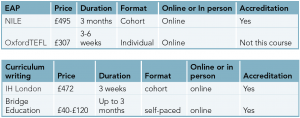Ready for the next step in your teaching career? Gerald Nikolai Smith explores what’s out there
Moving up in the ELT world is more confusing than ever. Instead of having the simple step of certificate to diploma, now teachers have many options. This is both a gift and a curse. Teachers no longer need to shell out £3,000 to slog through an eight-week diploma course. Training sites have begun offering micro-credentials in continuing professional development (CPD) that could only take a weekend. Upskilling courses provide an opportunity to show potential employers and students how knowledgeable and serious you are about specialising.
Providers
There are different types of providers for ELT upskilling. The most established institutions include International House (IH) London, Trinity (often through other organisations) and TESOL. Some like NILE in the UK and Bridge Education Group in the US count the online Training accreditor Aqueduto among their other accreditations.
There are also unaccredited online course providers. None of these is necessarily better than the others, but some are more expensive and may be more or less prestigious
Before deciding on a course, read through the description carefully! One site’s IELTS training course we came across said the four sections were “speaking, reading, writing and pronunciation”. Another site’s customer support said their business course was accredited by IATEFL, which of course does not accredit any courses.
Special programmes
There are a few special programmes for CPD. Trinity’s CertPT offers teachers the opportunity to choose modules/courses often at a reduced rate and then gives them a certificate upon completion of a set number of hours. This could be good for someone who doesn’t want to get a full diploma, but wants more than one specialist course.
Another programme worth highlighting is Bridge Education Group’s IDELT Online, which offers a way to apply course credits to an MA in TESOL from various US universities.
At NILE you can sign up for a modular MA offered in partnership with the University of Chichester and pay module by module. If you withdraw you can get credits or a university validated Postgraduate Certificate.
Specialisation courses
You don’t need to get a diploma or a Master’s to be taken seriously in ELT, especially online ELT. Instead, why not find an area you’re interested in, such as business English, English for Academic Purposes (EAP), or test prep for TOEFL or IELTS? Let’s dive into what’s out there.
Business English One of the more popular specialisations, business English is valuable especially for those wanting to work at a private language school or to strike out as a teacherpreneur.
IH London’s certificate of International Business English Training is by far the most expensive, but also rather prestigious. They provide an IBET certificate upon completion.
Trinity’s course is similar, though much longer and there’s a little more leeway for other options, such as part-time versus full-time study.
There are courses which work as an introduction to business English as well as a way of showing that a teacher is serious about their specialisation. Bridge has a reasonably priced accredited course with self-paced individual learning. ITA offers a quick cohort course, but it’s unaccredited.
Test prep With so many students wanting to study in English, tests proving English level are more important than ever. Maybe more interesting for teachers is that IELTS, TOEFL and Cambridge exam prep is quite lucrative.
Where you teach will determine which is the best for you, but for much of the world, IELTS is the standard. That being said, there is no such thing as an IELTS teaching certificate. However, there are plenty of courses which can help you get started.
If you’re looking to become an assessor, it may be worth going for NILE’s Assessment, Evaluation and Testing course. The two-month course goes in depth on what is effective testing and how to practise this in classes. It also costs less if you are taking a Trinity CertPT.
Teachers who want a short introduction to certain tests, like TOEFL or IELTS, might do well to take Bridge’s £40 micro-credential courses. Similarly, International TEFL Training Institute (ITTI) offers a bundle course for TOEFL and IELTS for £86.
IH World offers a self-paced IELTS course for £350. The course follows four modules (one for reading, writing, listening and speaking). If you just want to brush up on how to teach one section, you can join any module for £95.
EAP Working for universities and colleges is one of the better career paths for an EL teacher. While many pre-sessional teaching positions advertise DELTA or MA TESOL grads preferred, teachers without diplomas get hired all the time too. Upskilling can give a teacher the edge needed when applying.
Surprisingly, there are few EAP-focused courses. Oxford TEFL offers a one-to-one self-study EAP course for £307. It covers topics such as Learners & Contexts and Developing Learner Independence. The course takes up to six weeks to complete depending on how much time you devote to studying.NILE’s EAP course, at £495, runs once a year from April to June. It’s cohort based and focuses on how EAP is different from general English and how to respond to different students’ needs.


Curriculum writing Curriculum writing is a creative way to escape the classroom and work on designing classes. With online databases like OneStopEnglish allowing teachers to share their resources, getting into material writing has never been easier. Still, it helps to get a leg up through a course.
IH London’s course is both theoretical and practical. Cohorts workshop their material, evaluating and giving feedback on each others’ work. It runs once a year, with the next course starting June 2023.

Bridge offers two distinct courses on material writing: one micro-credential (Materials Development for the EFL Classroom, £40) and one specialisation course (Designing Custom Courses, £120). The first is about making creative and interesting lessons; the latter is geared toward designing a course for students who want to use English for specific purposes.
There are more areas to explore – teaching pronunciation or teaching young learners – but the ones here are a good start.

Gerald Nikolai Smith is an ESL teacher and multimedia journalist. A native Texan, he currently lives on a houseboat in Glasgow.







